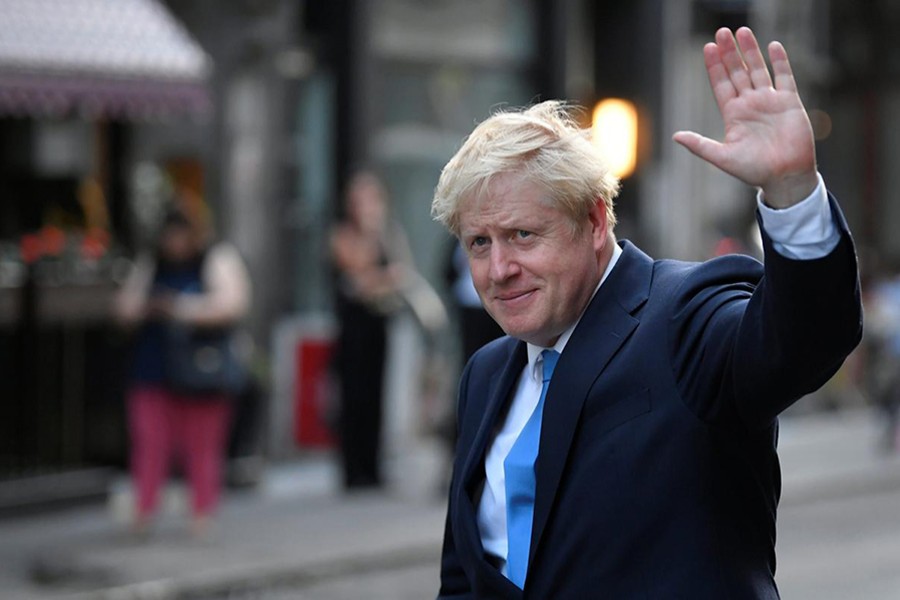Boris Johnson will take office on Wednesday as British prime minister and will unveil the names of the team he has tasked with delivering Brexit by the end of October, with or without a deal.
Johnson enters Downing Street at one of the most perilous junctures in post-World War British history - the United Kingdom is divided over Brexit and weakened by a three-year political crisis since the Brexit referendum.
His pledge to energise the country and deliver Brexit - do or die - on October 31, sets the United Kingdom up for a showdown with the EU and thrusts it toward a potential constitutional crisis, or election, at home.
“Like some slumbering giant we are going to rise and ping off the guy-ropes of self-doubt and negativity,” Johnson, 55, said on Tuesday after he was elected by Conservative Party members.
“We are going to energize the country. We are going to get Brexit done on Oct. 31 and we are going to take advantage of all the opportunities it will bring in a new spirit of can do.”
Wednesday will combine arcane British political choreography with the realpolitik of appointing a new government.
Prime Minister Theresa May will leave Downing Street after a three-year premiership that was mired by crises over Brexit. She will travel to Buckingham Palace to formally tender her resignation to Queen Elizabeth.
Johnson will then have an audience with the queen who will request he form an administration. His formal title will be “Prime Minister and First Lord of the Treasury”.
He will enter Downing Street in the afternoon and is expected to give a speech before appointing key members of the government - names that could give a hint of how he will handle Brexit, Britain’s most significant decision in decades.
“Boris will build a cabinet showcasing all the talents within the party that truly reflect modern Britain,” a source close to Johnson said.
Brexit Crisis?
But ‘Prime Minister Johnson’ - known for his ambition, mop of blonde hair, flowery oratory and a cursory command of detail - must solve a series of riddles if he is to succeed where May failed.
The 2016 Brexit referendum showed a United Kingdom divided about much more than the European Union, and has fuelled soul-searching about everything from secession and immigration to capitalism, empire and modern Britishness.
The pound is weak, the economy at risk of recession, allies are in despair at the Brexit crisis and foes are testing Britain’s vulnerability.
His party has no majority in parliament, the Conservatives only govern with the support of 10 lawmakers from the Brexit-backing Democratic Unionist Party in Northern Ireland.
Investors are braced to see who will be handed the top jobs such as finance minister, foreign secretary and Brexit minister.
A record number of ethnic minority politicians are expected to serve as ministers including Priti Patel, the former aid minister who resigned in 2017 over undisclosed meetings with Israeli officials, and employment minister Alok Sharma.
Oliver Dowden, once deputy chief-of-staff in David Cameron’s administration, former sports minister Tracey Crouch, junior finance minister Robert Jenrick and pro-Brexit lawmaker Rishi Sunak are also in line for promotion.
Interior minister Sajid Javid is widely tipped to stay in a top job and was spotted by British media flanking Johnson as he arrived before lawmakers following his victory.
There is talk that Johnson will appoint career diplomat David Frost as European Union sherpa and adviser on Europe.
No Deal?
Johnson has pledged to negotiate a new Brexit deal with the EU before October 31 but if the bloc refuses, he has promised to leave without a deal on Halloween.
That, many investors warn, would send shock waves through the world economy and tip the world’s fifth largest economy into recession or even chaos.
Brexit without a divorce deal would roil financial markets and, some bankers warn, weaken London’s position as the pre-eminent international financial center.
Brexit supporters say those fears are overblown and the United Kingdom will thrive if cut loose from the European project which they cast as a German-dominated bloc that is falling far behind its global competitors such as the United States and China.
“If he really wants a no-deal, he will get it. We will never push an EU member out but we can’t stop him. More likely, his own parliament would,” one EU diplomat said.


